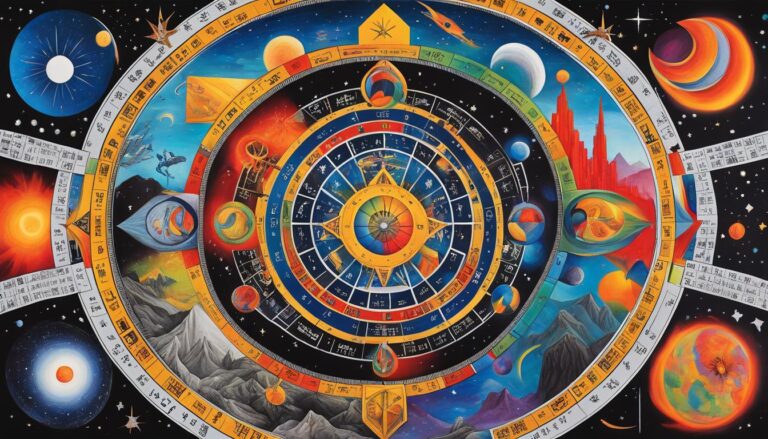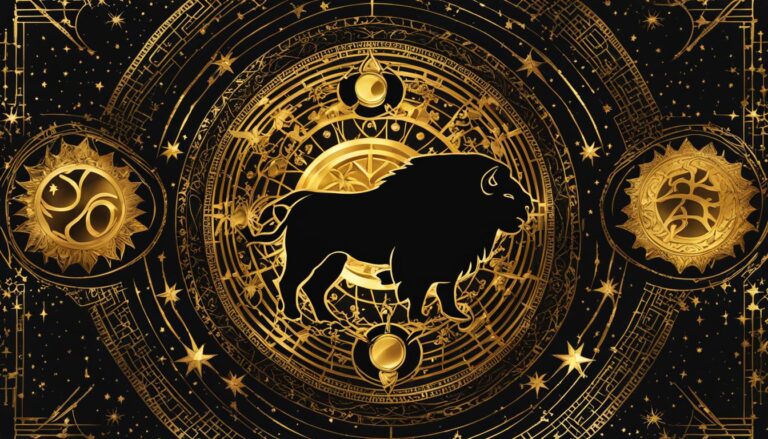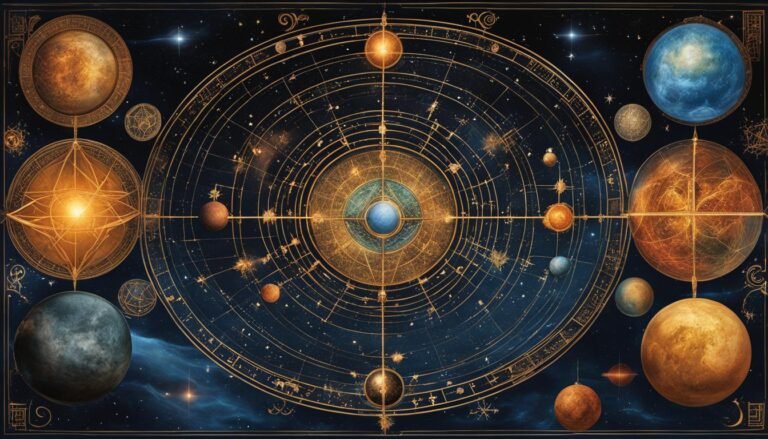How Many Types Of Astrology Are There?
Have you ever gazed up at the starry night sky and felt an inexplicable connection? If so, you’re not alone. Astrology has been a guiding force for countless civilizations throughout history. Understanding how many types of astrology there are can be a fascinating journey into the cosmos and our relationship with it. While the answer isn’t straightforward, we can explore the various astrology methodologies and astrology classifications that have evolved across cultures and time periods.
Whether you’re an avid astrology enthusiast or simply curious, the number of astrology types may surprise you. From the ancient art of Vedic astrology to the Western zodiac signs, each system offers a unique set of insights and wisdom. Indulge your curiosity as we delve into the celestial tapestry woven by these ancient practices and reveal the richness of astrological traditions around the world.
Key Takeaways
- Discover the richness of astrology types and their historical origins.
- Explore the various astrology methodologies spanning cultures and eras.
- Understand the broad astrology classifications – from Vedic to Western systems.
- Gain insight into how distinct traditions approach the stars and their meanings.
- Unlock a deeper connection with the cosmos through diverse astrological lenses.
The Ancient Origins and Evolution of Astrology
When you explore the classifications of astrology, it becomes evident that this ancient practice is not a singular concept but rather a rich tapestry of traditions woven across time and diverse civilizations. The astrology types you’re familiar with today have their roots deeply embedded in the evolution of human cultures, reflecting the collective quest to understand the intricate dance between the heavens and human fate. Let’s delve into how astrology’s historical development across various societies contributed to the myriad ways it is practised today.
Astrology’s Historical Development Across Civilizations
If you’ve ever wondered about how many types of astrology are there, consider its beginnings, spanning across ancient Babylon to the classical Greek era. Astrology’s framework, initiated around 1800 BCE in Babylon, gradually permeated through Greek culture, giving rise to Hellenistic astrology, a period marked by rich scholarly activity around astrological research between the 2nd century BCE and the 7th century CE. These astrology types were not isolated cultural artefacts but rather dynamic systems influenced by, and in turn influencing, neighboring civilizations.
From Astrology to Astronomy: A Shared Journey
The narratives of astrology and astronomy have been inseparably intertwined. In seeking to classify astrology and delineate its boundaries, it’s imperative to recognize its shared journey with the astronomical sciences. The meticulous record-keeping and observations of the ancient sky-gazers laid the foundational stones for what would evolve into modern astronomy. Yet, as you contemplate the different approaches in astrology, it’s fascinating to see the original blend of science and mysticism in the quest to make sense of the cosmos.
Cultural Impact of Astrology Over Millennia
Astrology’s reach extended to all corners of the known world with profound cultural impacts. From the precise Arabic innovations in Islamic astrology, which began in the 7th century, to the developments in Hellenistic astrology that sought to map planetary influence on human lives, each culture’s astrology type has offered unique insights into the human condition. The classification of astrology isn’t just about how astrology split into different branches; it’s also a testament to how it burgeoned as an integral part of human culture, reflecting the times and societies in which it thrived.
Astrology Around the World: Cultural Variations
As you delve into the realm of astrology, you’ll discover a rich tapestry of cultural variations that showcase the diversity of this ancient practice. Each culture has nurtured its own astrology categorization, with types of astrological practices that reflect its unique heritage and worldview.
Chinese Astrology: An Ancient Methodology
Rooted deep in antiquity, Chinese astrology is a prime example of astrology variations, offering a system that significantly differs from Western methods. Infused with a rich set of traditions, it places great emphasis on the balance of the five elements and the interplay of yin and yang, with the zodiac comprising 12 animals that represent different personality traits and fortune.
The Vedic Wisdom: Hindu Astrology’s Deep Insights
Forged in the spiritual fires of ancient India, Hindu or Vedic astrology operates within a framework of karma and reincarnation. With its roots going back to the 2nd century CE, it intricately intertwines with religious and societal norms offering guidance on pivotal life events, from marriage prospects to career choices, and continues to influence the lives of millions today.
Western Astrology: The Common Thread in Modern Times
Tracing its lineage back to the Hellenistic period, Western astrology is perhaps the most familiar to those in the modern world. It presents a solar-based zodiac that includes the familiar twelve astrological signs, each encompassing different types of astrology such as natal, sun sign, and horary. This system provides a common language for understanding personality traits, life events, and the greater cosmic trends that influence our existence.
Exploring the different types of astrology offers fascinating insights into how every culture has looked to the stars to find meaning and direction. Whether through Chinese, Vedic, or Western astrology, the stars speak a language that resonates across cultural bounds—yet each tradition interprets it through its own unique lens.
How Many Types of Astrology Are There?
As you delve into the celestial realm of astrology, you may find yourself wondering about the various astrology types and their unique practices. It’s a rich tapestry of knowledge, with each strand representing a different aspect of astrology categorization. The sheer diversity and classification of astrology are both fascinating and complex.
Often, astrology is classified not just by its cultural origin or historical context but by its application in our lives. From understanding your innate personality through natal astrology to making informed decisions based on the alignment of stars at a particular moment with electional astrology, the discipline offers tools and insights for various purposes. Below, we explore some significant categories that highlight the different types of astrology:
- Horoscopic Astrology: This approach casts a horoscope for an exact moment, such as a person’s birth, and is used to interpret various life aspects.
- Natal Astrology: Focused on an individual’s birth chart, it seeks to outline personality traits and potential life paths.
- Sun Sign Astrology: Perhaps the most familiar to the public, it’s based on the position of the sun at birth and provides broad insights into personality.
- Cultural Methodologies: Diverse methods like Chinese, Hindu (Vedic), and Western astrology reflect the spiritual and astronomical conventions of different societies.
- Functional Classifications: Branches such as horary astrology to answer specific questions, medical astrology for health insights, and mundane astrology for world events, show astrology’s application in varied domains of life.
Each category and methodology serves as a lens through which different cultures and societies have searched the skies to understand human experiences and worldly phenomena. Your journey into astrology may begin in one small corner of this expansive universe, but as you learn more, you’ll find that the wisdom of the stars is infinitely layered and nuanced.
So while the quest to quantify the different types of astrology may be challenging, the true value lies in exploring their unique perspectives and insights. As you continue on your astrological adventure, be prepared to discover many more types that resonate with your personal quest for knowledge and growth.
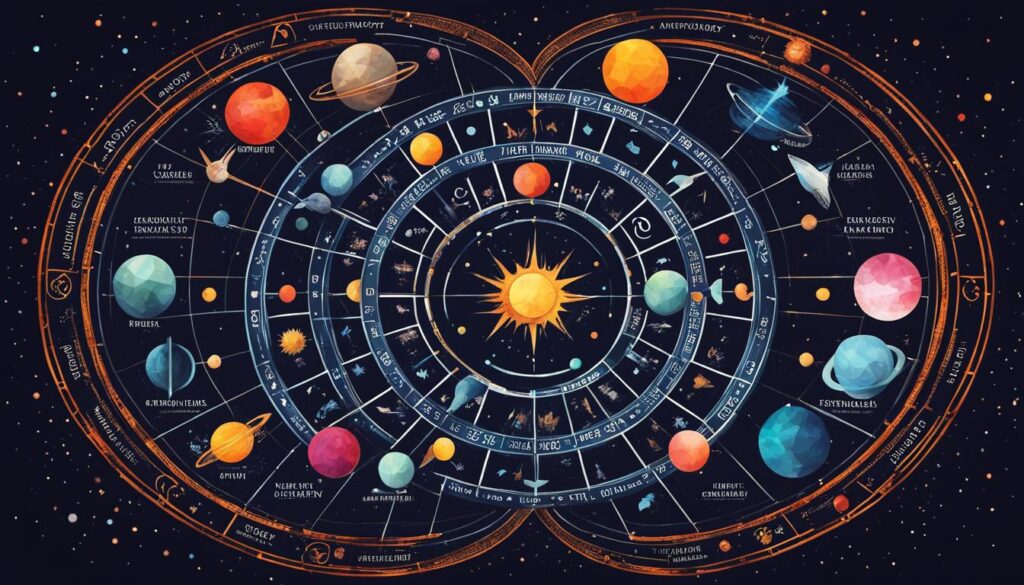
Key Astrological Systems: Sidereal and Tropical
When you delve into the world of astrology, you’ll quickly encounter two primary astrology classifications: sidereal and tropical astrology. These systems, each embracing various astrology methodologies, are cornerstones of the types of astrological practices found throughout the astrological community.
Sidereal astrology is deeply connected to the fixed stars and constellations. It takes into account the precession of the equinoxes, an astronomical phenomenon that accounts for the subtle shift of the Earth’s rotational axis over time. This effectively means that sidereal astrology is dynamic, changing with the actual constellations’ movements as seen from Earth, offering a celestial map that’s in real-time sync with the firmament.
In contrast, tropical astrology doesn’t align with the stars as sidereal does. Instead, it’s linked to the seasons, anchored by the vernal equinox, which marks the beginning of spring in the Northern Hemisphere. This system assumes an unchanging alignment between seasonal markers and the zodiac signs, which forms a more symbolic and seasonally based interpretation of the astrological year, independent of the stars’ current locations.
- Sidereal Astrology:
- Uses the actual position of the constellations
- Considers the precession of the equinoxes
- Utilized prominently in Hindu (Vedic) astrology
- Tropical Astrology:
- Based on the seasons and equinoxes
- Prominent in Western astrology
- Interprets celestial positions as symbolic
The choice between sidereal and tropical astrology affects how your horoscope is read and how you relate to your astrological profile. It’s not merely a matter of one being better than the other; it’s about what resonates with your personal search for meaning in the cosmos. Whether you’re drawn to the consistent, star-based guidances of sidereal, or the seasonally symbolic and perhaps more psychological approach of tropical, understanding these systems is essential for any astrology enthusiast.
The Zodiac Spectrum: A Look at Astrological Signs
When you delve into the realm of astrology types, one of the most colorful aspects you encounter is the Zodiac spectrum. This band of celestial coordinates gives us the twelve astrological signs, each contributing to the rich tapestry of astrology categorization. From the bold Aries to the intuitive Pisces, every sign holds key insights into personality traits and life paths.
Aries to Pisces: Understanding Zodiac Personality Traits
Embarking on a journey from Aries to Pisces can reveal a multitude of layers within the astrology variations. Here’s a glance at the different approaches in astrology when deciphering the distinctive energies of each sign:
- Aries: Known for their fiery ambition and leadership quality.
- Taurus: Grounded and sensual, Taurians value stability.
- Gemini: Intellectual and communicative, Gemini thrives on social interactions.
- Cancer: Emotional and caring, Cancerians are the nurturers of the zodiac.
- Leo: Charismatic and bold, Leos love to bask in the spotlight.
- Virgo: Meticulous and analytical, Virgos are the problem solvers.
- Libra: Diplomatic and fair, Libras seek balance and harmony.
- Scorpio: Intense and resourceful, Scorpios delve into life’s mysteries.
- Sagittarius: Adventurous and philosophical, Sagittarius pursues knowledge and freedom.
- Capricorn: Disciplined and ambitious, Capricorns are the achievers.
- Aquarius: Innovative and humanitarian, Aquarians advocate for change.
- Pisces: Compassionate and artistic, Pisceans embrace empathy and imagination.
Interpreting Planetary Influence Through Signs
Understanding the influence of planets on each zodiac sign broadens your grasp of the astrology categorization. Whether it’s Mars fueling the militant spirit of Aries or Neptune enhancing the dreamy aura of Pisces, planets play a crucial role in shaping the energies that the signs emanate:
- Ruling Planets: Every zodiac sign has a ruling planet that adds a layer of characteristics to the sign’s profile.
- Elemental Traits: The elemental nature—fire, earth, air, or water—complements the influence exerted by the ruling planets.
- Planetary Positions: In a birth chart, the position of planets can accentuate or challenge the sign’s natural tendencies, creating a unique individual expression.
Whether you’re a casual enthusiast or a devoted student of astrology types, understanding the variances within the zodiac can illuminate the paths you navigate and the decisions you make under the stars.
Branches of Astrology: Diverse Applications and Techniques
As you delve further into the realm of stars and planets, you’ll discover that the astrology categorization is as vast as the cosmos itself. Each classification of astrology offers a unique perspective and skill, allowing for astrology variations to color the tapestry of this ancient wisdom. Below are some types of astrological practices that have been guiding humanity through life’s mysteries for centuries.
Natal Astrology: Deciphering Life’s Blueprint
You might be familiar with the concept of a ‘birth chart’ or ‘natal chart.’ This is the cornerstone of natal astrology, where an intricate map of the heavens at your time of birth reveals your personality traits, potential life paths, and even hidden talents. Every aspect of this chart is a thread in the larger weaving of your life story, offering insights into the diverse tapestry that makes you, well, you.
Electional Astrology: Timing Your Life’s Events
Have you ever wondered whether there is a perfect moment to start a new venture or make a big life decision? Electional astrology is your ally in choosing auspicious times to launch your dreams. By analyzing the alignment of the planets and stars, this practice helps you determine the best timing to act, ensuring that the celestial tides are in your favor.
Horary Astrology: Answering Life’s Pressing Questions
Sometimes, you may have a burning question that demands an immediate answer. Horary astrology is the ancient art of divining solutions to your most pressing queries. By crafting a chart for the exact moment your question is conceived, horary astrology zeroes in like a cosmic detective, providing clear and concise answers reflected by the celestial alignments.
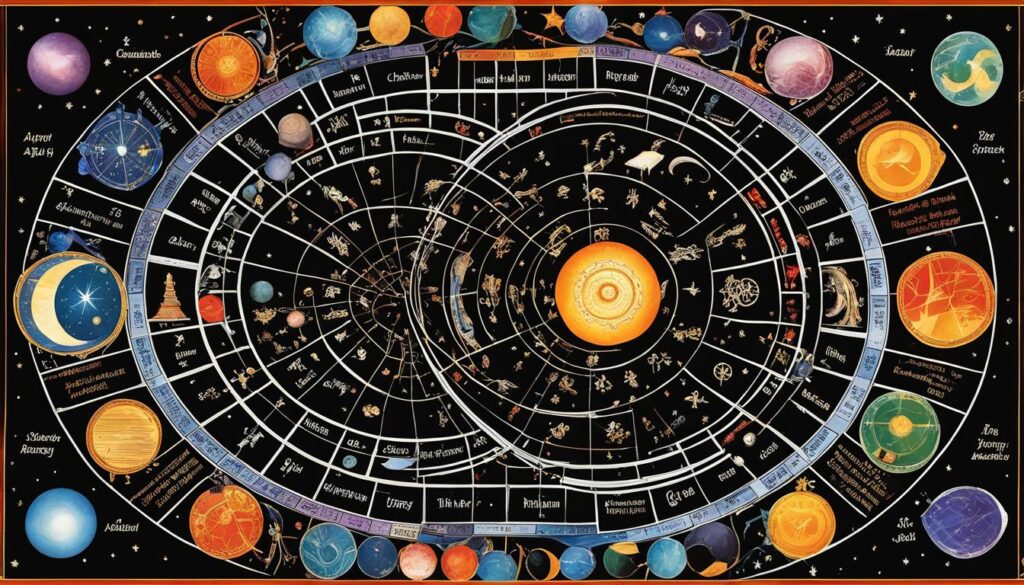
Intersecting Paths: Astrology’s Relationship With Other Disciplines
As you delve deeper into the world of astrology classifications, you’ll discover that its influence stretches far beyond its own domain. Astrology’s rich tapestry is woven with threads from numerous disciplines, creating a vibrant mosaic of knowledge and practice. This amalgamation highlights the different approaches in astrology, engaging a wider audience and providing a more comprehensive understanding of its principles.
Astrology doesn’t exist in isolation; it has historically intersected with different types of astrological practices and fields of study. Take, for instance, the ancient alchemical traditions where astrology played a crucial role in experiments, as it was believed that the positions and movements of celestial bodies could affect and transform the materials worked with.
- An in-depth exploration into the realms of archaeoastronomy reveals how our ancestors used astrological insights to erect structures aligned with the stars.
- In the realm of astrotheology, astrology and spirituality merge, offering a perspective where celestial events influence and reflect spiritual teachings and beliefs.
- The mystical correlations between numbers and celestial bodies have enriched the field of numerology, forging a unique path that intertwines with astrology.
Even today, modern psychological approaches leverage the astrology variations to further understand the complexities of the human psyche. Astrological symbols and archetypes often find a place in the therapeutic setting, helping you to navigate personal growth and self-understanding.
What’s evident in the exploration of astrology’s intersections with other disciplines is its fluidity—its remarkable ability to adapt and find relevance within various contexts. Whether you’re a seasoned astrologer or new to this world, appreciating these connections enriches your practice and expands the horizons of different approaches in astrology.
Modern-Day Adaptations: The Evolution of Astrological Practice
As you navigate our ever-connected digital world, it’s impossible not to notice the profound impact of technology on ancient practices such as astrology. The digital age has substantially widened the reach of various astrology methodologies, making the wisdom of the heavens more accessible and integrated into our daily lives than ever before.
The Digital Age: Online Astrology and Horoscopes
With just a few clicks, you can now access an array of astrology types and readings tailored specifically to you. Online astrology platforms deliver personalized horoscopes, detailed birth chart analyses, and even real-time astrological updates. These resources provide a bridge between traditional astrology classifications and contemporary digital convenience, reshaping how we interact with the stars.
Integrating Astrology into Everyday Decisions
Whether you’re contemplating a career shift or mulling over relationship dynamics, astrology can offer a unique perspective. Different approaches in astrology, such as astrocartography for location-based insights or Uranian astrology for more nuanced interpretative techniques, are now playing a role in guiding everyday choices. They help us understand the celestial accents that underscore our life’s script, making the ancient art of astrology a relevant decision-making tool in the modern era.
- Identifying optimum dates for major events with electional astrology
- Utilizing natal charts to uncover one’s innate strengths and challenges
- Implementing horary astrology for clear answers to specific queries
These modern adaptations ensure the age-old science of the skies endures, continually evolving and expanding its relevance. By weaving astrology into the fabric of your daily life, you tap into a cosmic guide that has illuminated human understanding through the ages.
Conclusion
Embarking on the path of astrological exploration opens up a constellation of possibilities that align with the richness of your personal narrative and the unfolding tapestry of your experiences. The expanse of astrology, with its intricate astrology categorization and various astrology methodologies, offers an informative and transformative journey. Whether you’re navigating life’s challenges or celebrating its triumphs, there exists a celestial alignment, a map written in the stars, that echoes your story.
Choosing an Astrology Type That Resonates With You
As you sift through the types of astrological practices, remember to embrace an approach that mirrors your philosophies and connects with your innermost self. Be it the deep historical roots of Vedic astrology that provide a time-honored wisdom or the precise timing furnished by electional astrology for life’s pivotal moments, your selection is a personal reflection of the cosmos through your eyes. This practice isn’t a one-size-fits-all; it’s a bespoke guide crafted just for you.
Continuing the Journey of Astrological Discovery
Yours is a lifelong expedition, a quest for knowledge through the lens of astrology classifications that is as boundless as the night sky. Each step taken is a stride further into understanding not only the mechanisms of this ancient art but also the revelations about your destiny entwined within. Your voyage may begin under the gentle light of the Moon or the fiery trails of Mars, but it will surely lead to the discovery of the most profound constellations—the ones that reside within you.
FAQ
How many types of astrology are there?
There are numerous types of astrology practiced around the world, each with its own unique methodologies and applications. While an exact number is difficult to specify due to the wide range of cultural and historical astrological practices, major types include Western, Vedic, Chinese, and Hellenistic astrology, among others.
What are the key differences between sidereal and tropical astrology?
Sidereal astrology is based on the actual positions of the stars and constellations, considering the precession of the equinoxes. Tropical astrology, on the other hand, aligns its zodiac with the Earth’s seasons and is based on the position of the Sun relative to the Earth at the vernal equinox.
Can astrology be connected to other disciplines?
Yes, astrology intersects with various other disciplines such as psychology, alchemy, and numerology. It has also played a role historically in the development of astronomy and has cultural ties with fields like archaeoastronomy and astrotheology.
In astrology, what is the significance of the zodiac signs?
Zodiac signs play a central role in astrology as each of the twelve signs represents different personality traits, behavioral tendencies, and potential fortunes. They are influenced by their ruling planets and associated elements (fire, earth, air, water), which together guide astrologers in making interpretations and predictions.
What are some branches of astrology and their applications?
Astrology consists of several branches, including natal astrology that focuses on an individual’s life path and potential, electional astrology that helps choose auspicious times for events, and horary astrology which answers specific questions by examining the alignment of celestial bodies at the time of the question.
How has astrology evolved in the modern era?
Astrology has adapted to the modern world by embracing digital technologies. Online platforms now offer personalized horoscopes, while new practices like astrocartography and Uranian astrology expand on traditional methodologies for contemporary needs and interests.
What is the relationship between Chinese, Hindu, and Western astrology?
Chinese, Hindu (Vedic), and Western astrology are distinct systems that have evolved separately in different cultures. Chinese astrology is based on a lunar calendar and involves the twelve zodiac animal signs, Hindu astrology (or Vedic astrology) is deeply intertwined with Indian culture and religious practices, while Western astrology is widely recognized for its solar zodiac and psychological approach.
Are online astrology readings accurate?
The accuracy of online astrology readings depends on the depth of the information provided and the expertise of the astrologer interpreting the birth chart. While online readings can offer convenience and personalized insights, they may vary widely in terms of thoroughness and personal relevance. It is recommended to approach online readings with discernment and consider them as one tool among many for guidance.
What is the benefit of knowing my astrological sign?
Knowing your astrological sign can provide insights into your personality traits, natural tendencies, strengths, and possible challenges. It can also offer a way to understand how you may relate to others, how you approach various situations, and what timings may be beneficial for certain types of activities or decisions.
How do astrologers use planetary influence in their readings?
Astrologers examine the positions and movements of planets at the time of your birth or a specific event to interpret how these celestial bodies might influence your personality, behavior, and life experiences. Each planet is associated with certain attributes and energy, which an astrologer considers within the context of your zodiac sign and house placements in the birth chart.





